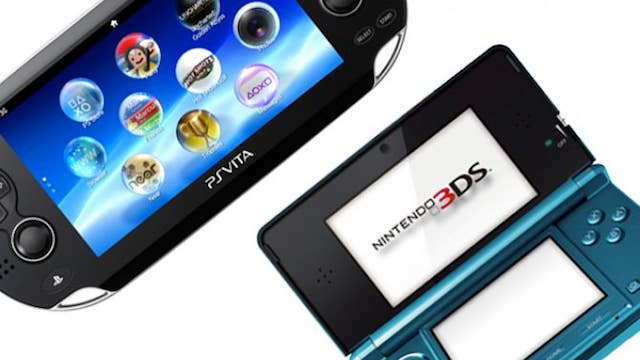The Year that Handhelds Died
Will there ever be another dedicated handheld system? The evidence in 2015 points to "no"
Editor's Note: This is one in a series of year-end content to be published daily leading up to Christmas that includes analysis, opinion and insights into the biggest news and trends of 2015.
When the history books are written on the first few decades of the video game industry, the chapter on handhelds may wrap up with the events of 2015. As GamesIndustry.biz continues to look back on the biggest events of the past year, one trend has become obvious: the era of handhelds is quickly coming to a close. That's not to say that there isn't an audience for these devices (Nintendo 3DS and PlayStation Vita have loyal followings), but this industry is often a numbers game, and the numbers aren't adding up.
For all its wonderful features and indie support, the Vita has only sold somewhere in the range of 12 million units (Sony stopped reporting figures before getting to double digits, so fully accurate numbers aren't available). Vita represented a precipitous decline from the PSP, which managed to sell over 80 million units. The 3DS meanwhile is faring much better than the Vita, around 55 million units, but that also pales in comparison to its predecessor, Nintendo DS, which sold upwards of 155 million units globally.
It's no small coincidence that while this generation's dedicated handheld devices have been struggling to live up to the handhelds of years past, mobile gaming has seen a meteoric rise. The first iPhone launched in 2007; by the time the iPhone 4 launched in 2010 (a full year or more ahead of the current handhelds) researchers at Gartner already pegged the mobile games industry at $6.7 billion. The fact is that Vita and 3DS were destined for a huge uphill battle from the very start. It's only to Nintendo's credit and the immense strength of its first-party software that 3DS managed to perform moderately well in the face of the mobile juggernaut.
In 2015 both Sony and Nintendo have all but conceded defeat on the handheld front, resigned to the fact that mobile gaming is dominating the market. As Sony Computer Entertainment Worldwide Studios boss Shuhei Yoshida admitted about the handheld space, "the climate is not healthy for now because of the huge dominance of mobile gaming." The odds of Sony releasing a successor to the Vita in the years ahead are just about zero.
Likewise, for Nintendo, for the first time in the company's history, we have to wonder if a new dedicated handheld is even in the works at its R&D division currently. After years of protest about the mobile space from its executives, Nintendo has taken the plunge into mobile via a partnership with DeNA. Back in 2011, Nintendo president Satoru Iwata questioned the impact of the burgeoning mobile gaming market. "Game development is drowning. Yes, nearly every one of these downloadable games is far less expensive to create than most retail titles, but what revenues do they generate?" he asked. By 2015, Nintendo management realized that it could no longer ignore the mobile space or its shareholders pleading with the company to start making mobile titles.
"For the majority of people who are already buying a powerful smartphone, the additional expense for a handheld is no longer worth it, and by extension it becomes a foolish business endeavor for Sony or Nintendo to keep investing in those dedicated devices"
While it's true that games for touch-based devices have to be designed much differently than when your audience has buttons and a directional pad at its disposal, Nintendo has an abundance of smart game designers. Moreover, the cost to Nintendo to create mobile games (even highly polished, sophisticated ones) will be monumentally cheaper than engineering, manufacturing and supporting yet another new platform.
Besides, as Rob Fahey pointed out in an earlier column, "when the competition has a great multi-touch screen and accelerometer, a processor faster than most laptops only a few years ago, and is replaced every couple of years with a better model, the best set of buttons and sticks on earth just can't compete for most consumers." And that's precisely the point - if you're reading this website, you're not "most consumers" and neither am I. I far prefer sticks and buttons to touch screens, but for the majority of people who are already buying a powerful smartphone, the additional expense for a handheld is no longer worth it, and by extension it becomes a foolish business endeavor for Sony or Nintendo to keep investing in those dedicated devices.
That being said, there is one possible way around this for Nintendo: a hybrid console. I maintain that the Nintendo NX will look to combine the best of console and handheld technology into one platform. In a sense, Nintendo was attempting to do this with the Wii U tablet/gamepad, enabling gameplay away from the TV screen, but it wasn't fully mobile. The NX, I believe, will be a fully contained console that plays just as well on the go as it does when hooked into a 65-inch HDTV. It's the best of both worlds, a natural evolution for Nintendo's product lines that doesn't bog them down with a dedicated handheld proposition that will likely fail. At the same time, Nintendo's developers can look into placing hooks or certain cross-platform initiatives in its mobile titles to help up-sell customers on its beefier console titles.
Handhelds have come a long, long way since Nintendo's Game Boy was introduced in 1989. But no technology lasts forever. Much like Sony's Walkman, VCRs and corded telephones, handhelds can now be added to humanity's long list of technological relics.

